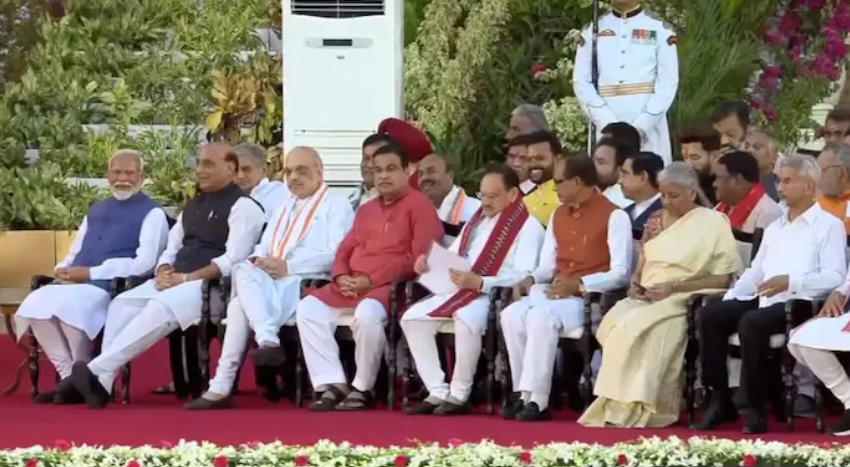Delhi: Modi presents new government, issues first measure for farmers
The BJP leader was sworn in this morning at the presidential palace. Like after his 2019 victory, he authorised financial assistance to farmers. Election results confirm the drop in popularity of ultranationalists in rural areas. For the first time, no Muslim is in the 71-member Council of Ministers.
New Delhi (AsiaNews) – Narendra Modi was sworn in this morning for a third term as prime minister, after the National Democratic Alliance (NDA), the coalition of which the Bharatiya Janata Party (BJP) is a part, won a majority with 293 seats.
Victory, however, came with a smaller margin than expected, which will force the BJP to reckon with its allies, in particular the Telugu Desam Party and Janata Dal (United).
Speaking last Friday, after he was formally named NDA head, Modi insisted that the “Opposition tried to paint 2024 Lok Sabha results as a loss for us. But we didn’t lose, we never lost, we will never lose.”
Along with the prime minister, 71 members the new Council of Ministers took the oath of office: 30 cabinet ministers (heads of ministry), 33 ministers of state (who deal with a specific area within a ministry), and five ministers of state with independent office (who do not report to any ministry).
This year, for the first time, the Council will have no Muslim member, even though the prime minister responded to opposition accusations by saying that the NDA was committed to religious equality in the country.
Modi loyalists – Amit Shah, Rajnath Singh, S. Jaishankar, Nikita Gadkari – will keep key ministries (Home Affairs, Defence, Foreign Affairs, Transport), while BJP allies were given 11 ministries with portfolios.
As some observers had predicted, unlike the last two terms when the BJP had a majority to govern alone, this time Modi has to take into account the demands of the other parties to stay in power.
At the swearing-in ceremony this morning at the Presidential Palace (Rashtrapati Bhavan), in Delhi, attended by regional leaders (in accordance with Modi’s “neighbourhood policy”), Bollywood stars, and business leaders, Modi said that he would uphold India's sovereignty and integrity and rule with "true faith and allegiance to the constitution. I will do right to all manner of people in accordance with the constitution and the law without fear or favour.”
After he was sworn in, the Indian prime minister released a new instalment of the Pradhan Mantri Kisan Samman Nidhi (PM-KISAN), a financial assistance programme that grants 6,000 rupees (less than US$ 72) per year to farmers deemed eligible. In 2019, Modi did the same right after winning the elections.
“Ours is a government fully committed to Kisan Kalyan (farmers’ welfare),” Modi said. “We want to keep working even more for the farmers and the agriculture sector in the times to come.”
To this end, "Empowering the poor and middle class is our priority," Modi said recently.
The Union Ministry of Agriculture has a budget of 1.27 billion rupees for 2024-2025 fiscal year, although the full budget is likely to be released only in July.
In the last 10 years in power, Modi has lost farmers’ support. Election results report a 2.2 per cent drop for the NDA in rural areas, while the opposition alliance, led by the Indian National Congress (INC), gained 18 per cent in rural and semi-rural areas.
In the State of Haryana, India’s “breadbasket”, the BJP took all 10 seats in 2019, but only five this year, losing the others to the INC, which leads the opposition coalition called INDIA (Indian National Developmental Inclusive Alliance).
In Rajasthan, where the state government switched sides in December to Prime Minister Modi's ultranationalist Hindu party, the BJP won 14 out of 25 seats. Here, too, it had taken all of them in 2019.
Some experts suggest the BJP's declining popularity among farmers is due to the 2020-2021 protests that forced the government to withdraw a series of reforms in favour of market liberalisation.
As late as February this year, just two months before the start of voting, farmers marched again on Delhi, criticising the government for not keeping the promises it made after 2020, such as guaranteed minimum crop prices, doubling of farmers' incomes, cancelling loans. This undercurrent was not picked in pre-election polls that predicted a landslide victory for the BJP.
23/02/2024 19:29







.png)










